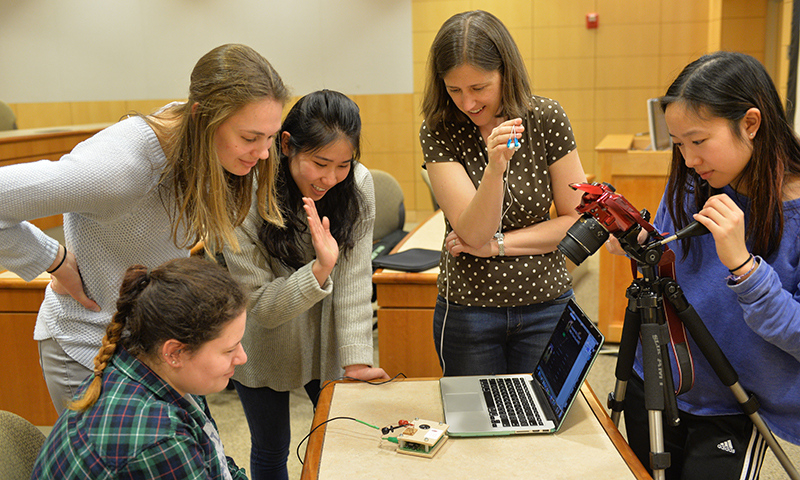Heather J. Rhodes
The natural world never ceases to amaze me. Through my research, teaching, and outreach programs I seek to explore my own curiosity and stir up the curiosity of others.
Learning & Teaching
- Biology 220: Multicellular Life
- Biology 334: Comparative Physiology, Human and Non-human Animals.
- Biology 349: Neurophysiology
- Neuroscience 312: Current Topics in Neuroscience
- Professor, Department of Biology at Denison University, present
- Director (2025-2026) and Associate Director (2017-2018), Grass Fellowship Laboratory, Marine Biological Laboratories, Woods Hole, MA.
- Visiting Researcher, Queensland Brain Institute, Brisbane, Australia, 2023
- Postdoctoral fellow, Department of Biology at Boston University, 2004-2007
- Grass Fellow at the Marine Biological Laboratories, Woods Hole, MA, 2006
- Postdoctoral researcher, Department of Neurobiology at Duke University, 2004
Research
Social and Reproductive Behavior in Aquatic Frogs
I have worked with the African clawed frog, Xenopus laevis, for many years. They live in dense colonies and reproduce in the bottom of murky ponds at night. Thus they must use non-visual cues to establish their social structure and find mates. We know they use a relatively elaborate (for a frog) vocal repertoire for social signaling, but they also use chemical and somatosensory signals. Males employ multiple tactics for securing a mate. I am interested in understanding what social signals they use, how they use them, and under what conditions different social and reproductive may be employed. My students and I approach these questions using a variety of techniques, including behavioral observations, endocrine manipulations, and neurophysiological recordings.
Chemosensation in Cephalopods
More recently, I have begun research into the neurobiology of squid, octopuses and cuttlefish (collectively referred to as cephalopods). These fascinating animals evolved large and complex brains separately from vertebrates, making them a remarkable group of animals to study the evolution of the nervous system. I am particularly interested in how the detect chemicals using receptors on their arms and tentacles and how they may use that information to select appropriate behaviors.
Works
- Rhodes, H.J. & Amo, M. (2022) Electrophysiological responses to conspecific odorants in Xenopus laevis show potential for chemical signaling. PLoS ONE 17(9): e0273035.
- Rhodes*, H.J. & Fouke*, K.E. (2020) Electrophysiological and motor responses to chemosensory stimuli in isolated cephalopod. Biological Bulletin, 238:1-11. *authors contributed equally to this work.
- Kelley, D. B., I. H. Ballagh, C. L. Barkan, A. Bendesky, T. M. Elliott, B. J. Evans, I. C. Hall, Y. M. Kwon, U. Kwong-Brown, E. C. Leininger, E. C. Perez, H. J. Rhodes, A. Villain, A. Yamaguchi, and E. Zornik. (2020). Generation, Coordination, and Evolution of Neural Circuits for Vocal Communication. The Journal of Neuroscience 40:22-36.
- Kelley, D.B, Elliott, T.M., Evans, B.J., Hall, I.C., Leininger, E.C., Rhodes, H.J., Yamaguchi, A. & Zornik, E. (2017). Probing forebrain to hindbrain circuit functions in Xenopus. Genesis, 55: e22999.
- Rhodes, H.J., Stevenson, R.J. & Ego, C.L. (2014). Male-male clasping may be part of an alternative reproductive tactic in Xenopus laevis. PLoS ONE, 9(5): e97761.
- VanHooser, S., Roy, A., Rhodes, H.J., Culp, J. & Fitzpatrick, D. (2013). Transformation of receptive field properties from lateral geniculate nucleus to superficial V1 in the tree shrew. J Neurosci, 33(28): 11494-11505.
- Zornik, E., Katzen, A., Rhodes, H.J. & Yamaguchi, A. (2010). NMDAR-dependent control of call duration in Xenopus laevis. J Neurophysiol 103(6): 3501-3515.
- Rhodes, H.J., Yu, H.J. & Yamaguchi, A. (2007) Xenopus vocalizations are controlled by a sexually differentiated hindbrain central pattern generator. J Neurosci, 27(6):1485-1497.
- Chisum, H.J. & Fitzpatrick, D. (2004). The contribution of vertical and horizontal connections to the receptive field center and surround in V1. Neural Networks, 17(5-6):681-93.
- Chisum, H.J., Mooser, F. & Fitzpatrick, D. (2003). Emergent properties of layer 2/3 neurons reflect the collinear arrangement of horizontal connections in tree shrew visual cortex. J Neurosci, 23(7):2947-2960.
- Courchesne, E., Karns, C., Davis, H., Ziccardi, R., Carper, R., Tigue, Z., Chisum, H.J., Moses, P., Pierce, K., Lord, C., Lincoln, A.J., Pizzo, S., Schreibman, L., Haas, R.H., Akshoomoff, N.A., Courchesne, R.Y. (2001). Unusual brain growth patterns in early life in patients with autistic disorder: An MRI study. Neurology, 57: 245-54.
- Courchesne, E., Chisum, H.J., Townsend, J., Cowles, A., Covington, J., Egaas, B., Harwood, M., Hinds, S., Press, G.A. (2000). Normal brain development and aging: quantitative analysis at in vivo MR imaging in healthy volunteers. Radiology, 216:672-682.
- Courchesne, E., Chisum, H. & Townsend, J. (1994). Neural activity-dependent brain changes in development: Implications for psychopathology. Development and Psychopathology, 6:697-722.
Other
- 2022 Tibbie Leslie Travel Grand Award from the Licking County Foundation for travel in Queensland, Australia.
- 2022 Denison University Research Foundation award for the project “A comparative study of cephalopod chemosensation in Queensland, Australia”
- 2022 Covid Reengagement Grant from the Provost’s Office, Denison University
- 2017 Pay-It-Forward Grant from Ohio Campus Compact for student philanthropy as part of a course in science educational outreach.
- 2016 Pedagogical Practice Project “Using science in the media as a gateway to the primary literature” from the Center for Learning and Teaching, Denison University.
- 2016 Pedagogical Practice – Service and Experiential Learning Award for “The use of directed study courses to create an interdisciplinary service learning experience for Denison students.” from the Alford Center, Denison University.
- 2010 Denison University Research Foundation award for the project “Hormones and Social Signaling in the African Clawed Frog (Xenopus laevis)”
- 2006-2008 Individual Postdoctoral National Research Service Award (NRSA), NIH/NINDS for the project “Neuronal control of sex-specific vocal-motor behavior.”
- 2023-2028 Julian H. Robertson Jr. Endowed Professorship awarded for exemplary achievements in teaching, scholarship, and service to Denison University.
- 2019 Outstanding Faculty Award – Kappa Alpha Theta. A national award given to 10 faculty from a pool of candidates nominated by students at colleges and universities across the country.
- 2019 R.C. Good Faculty Fellowship, granting a one semester leave from teaching to focus on scholarly work. Denison University.



